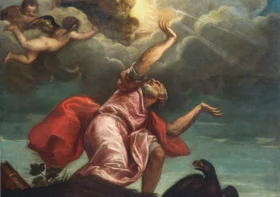Law and Gospel

Law and Gospel (1529) by Lucas Cranach the Elder
Parasha Nitzavim
Deuteronomy 29:9-30:20
24 Sep 2022
Shabbat shalom! Today’s parahsa covers Deuteronomy 29:9-30:20 and is titled Nitzavim, which translates to “those taking a stand.”
This passage showcases how the New Testament is hidden and nascent in the Old and how the Old Testament is revealed and fulfilled in the New. More specifically, it shows how the Law foreshadows the Gospel. To see this, we first must imagine ourselves in the position of the Israelites as Moses delivers to them a series of warnings and promises before entering the Promised Land.
After an abrupt and traumatic exodus, you and your kin have spent half a lifetime as disoriented nomads. Finally, you are so close to home that you can almost hear it whispering your name. At this, you relax and, worse, you forget. Not a good idea. There is a reason why 69% of automobile accidents occur within 10 miles of home. As we approach home, we grow comfortable, let down out guard, and start focusing our attention on domestic matters and forget about driving.
Chapter 29 contains Moses’ warning to the people to never forget nor neglect the fact that they are likewise on a journey with two mutually exclusive destinations: paradise or the ditch. In this chapter, every person of Israel, from highest to lowest, enters into a sworn covenant with the Lord. The terms were simple: If you obey Me, I will be your God and Cannan your land. This, we are told, is the fulfillment of the promise God made to the Patriarchs of old. Yet, should they break the covenant by disregarding the Lord’s commands, especially with idolatry, they will be cursed. The fierceness of the Lord’s jealousy will be unstoppable at that point, and it will devour the idolater. Israel’s demise will be like that of Sodom and Gomorrah, and she will become the pity of nations.
On the other hand, in Chapter 30, Moses enumerates the blessings that are to follow from obeying the Law and loving the Lord with all their heart and soul. Most notably, this includes the Lord circumcising their hearts, giving them the land, and making them fruitful. He also promises to gather all of them back to Israel after scattering them, even if that means scouring the uttermost parts of Heaven for any outcasts. Lastly, he promises to reverse Israel’s curses to apply to their enemies.
From history, we know Israel received at different times both the blessings and the curses. After inhabiting the Promised Land, she fell away and suffered dearly for it. Yet, for the faithful who came after those idolatrous generations, God, in His mercy, restored them to Himself and to His covenant.
Strictly speaking, everything to this point has described the workings of the Law. The Law is the half of Scripture that gives God’s commands and promises. In the words of Luther, it does this, “first to bridle civil transgressions, and then to reveal and to increase spiritual transgressions.” The Law amplifies and makes clear our total depravity, thereby terrifying our conscience. This keeps us from falling asleep at the wheel, as it were.
Paul, however, elaborates further on this point: “[…] the law came in to increase the trespass, but where sin increased, grace abounded all the more.” The condemnation of the Law only serves to magnify the grace of the Gospel, which is the other half of the Scriptures. So, after the Law jolts our conscience to terror, we run all the faster to the Gospel, which comforts and soothes our consciousness with the good news of Jesus’ atonement for our sins and His deep desire to forgive us.
In this new light, the warnings of Chapter 29 resemble the Law, and, more importantly, the promises of chapter 30 serve as intimations of the Gospel!
- The Israelites were lost in the wilderness as we are lost in our transgressions.
- God elected them from all nations as He predestined us for salvation.
- He established the old covenant with them by circumcising their hearts and established the new covenant with us by baptizing us.
- He led them into the Promised Land as He is leading us into His Heavenly Kingdom.
- They were restored by renewed obedience after dishonoring God; we are saved by grace through faith after doing the very same.
It is no wonder the Scriptures teach that the New Covenant is better than the Old; we are very privileged to claim membership in it! Yet, we should never forget the Law. In fact, we would be without excuse if we did! Chapter 30 verse 11 states that the command of the law, “is not too hard for you, neither is it far off.” Indeed, the Law is always accusing us through our conscience. Why? Because our constant sinning cries out to God for judgment, and we know anything less than an omnibenevolent God would have simply killed us long ago. Jonathan Edwards put it this way: “The bow of God’s wrath is bent, and His arrows made ready upon the string. Justice points the arrow at your heart and strings the bow. It is nothing but the mere pleasure of God (and that of an angry God without any promise or obligation at all) that keeps the arrow one moment from being made drunk with your blood.”
Our only hope, and that of our neighbor, is to denounce all idols in our lives, pick up our cross, and follow Christ in loving obedience all the way to the feet of the Father. If you haven’t yet, let today be that day, since tomorrow is not guaranteed.




Leave a Reply